#and yes prometheus and nyx are titans
Note
Okay, I don’t intend to sound rude, but do you actually like ANY of the gods? Feels like whenever anyone brings one of them up you’re like “mmm. don’t like that one either”
HAHA no dw not rude at all, good question. im sorry, i didn't mean to sound like a hater!!!!!!
there's plenty of gods i like!
to name a few: Prometheus, Helios, Oceanus, most of the titans really, Demeter, Hera, Athena, Apollo, Persephone, Gaia, Nyx, Thanatos, etc.
but there are a special three that i really REALLY dislike: Poseidon, Artemis, Dionysus.
now, everyone knows that greek mythology is full of confronting and gross and sad stories, that's just the way it was back then. so for most gods, i can kinda see "ok i sort of get why this myth goes this way". but Poseidon, Artemis and Dionysus in particular, i just CAN'T get over them. for Artemis and Dionysus this is mainly about the Aura myth. it's too gross, it's too bitter, and i can't rationalise it. but they're pretty popular. i know loads of people love Dio. and yeah, i do use him a lot in my quotes. but, in my heart, i can't really stand him, or the other two. so, sometimes when i see them in my inbox, i just feel sour about them and i don't really have an enthusiastic response.
anyways. that's just my peeve. hope this explains things!!!!!!!
edit: also btw. i love it when u guys share things with me. yes, even if it's something i disagree with. coz ultimately the cool thing about mythology is that there's so many different versions/interpretations. it's fun to see other ideas especially when they change your opinion about something. like, i never cared too much about Hera, but reading people's takes on her, and watching media that portrayed her differently made me change my mind about her, and now she's one of my favourites. so yeah.
#lmfao. i DO like hating on things. but in this case. it's not fun hate. i genuinely dont like Artemis Dionysus or Poseidon#it's funny because Artemis was always one of my favourites. and then i just read into her myths more and she just became so cold#anon#anonymous#asks
35 notes
·
View notes
Note
Hi! I wanted to know if it is possible to worship the primordial gods, and if yes, how? Thanks a lot
Hi there!
So, just in case someone reading it might not be too familiar with them, primordial deities are the first generation of gods and goddesses (emerged fully-formed at creation) representing the fundamental forces and physical foundations of the world. Their worship was not too common and sometimes the deities weren't even given human characteristics.
Yes, of course, it's possible to worship primordial gods!
I worship them similar to how I do it with other generations of gods if that makes sense? So it doesn't make much of a difference if I'm praying to a Titan, an Olympian or a Primordial god. It might only slightly change depending on what kind of deity they are, so if they're Chthonic [Underworld], Ouranic [Heaven] or Einalic [Sea], you know? And when it comes to offerings and such, I just look at their domains and again, the kind of deity they are.
Unfortunately, there is little information on how Primordials were worshipped in antiquity, so in some cases, we can only assume things and rely on UPGs. Some of these gods had temples and shrines and even festivals, others might have had them too although we have no information regarding that.
Here are some notable mentions:
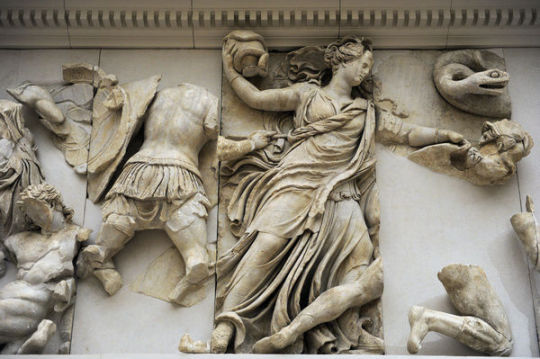
Nyx - Primordial Goddess of Night [Chthonic, although at night she's in the sky]
Notable epithets: Asteroömmatos (Star-eyed), Trophós (Nurse of The Gods), Melanópteros (Black-winged)
Some of her attributes include: wings, chariot, dark mists,
It's likely Nyx was invoked in rituals involving witchcraft
▪︎ Megara, Greece - oracle of Nyx [Pausanias, Description of Greece]
▪︎ Lemuria, Roman festival [May 9] - a rite for Nox was performed during the festival (Roman 'equivalent' of Nyx) [Ovid, Fasti]
Good info on Nyx - epithets + Orphic Hymn: LINK
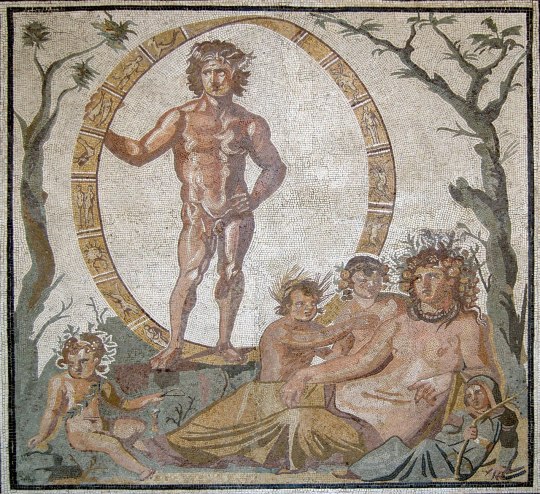
Khronos - Primordial God of Time (Ananke's consort)[Ouranic]
Notable epithets/his other names: Aion, Poros (Contrivance)
Some of his attributes include: the zodiac wheel,
scythe
Khronos was essentially a cosmological double of the Titan Kronos. In antiquity the two deities were sometimes equated with each other.
Khronos was also sometimes identified with Aion (God of Time, Eternity, and Zodiac) but often that's just considered his other name.
Khronos played a part in Orphic Mysteries.
He is sometimes depicted turning the zodiac wheel.
▪︎ Possible [Alexandrian] festival of Aion: 6 January (his birthday)
Good info on Khronos: LINK

Ananke - Primordial Goddess of Necessity (Khronos' consort)[Ouranic]
Notable epithets: Adrasteia (Inescapable), Tekmôr (Purpose)
Some of her attributes include: a torch
Ananke was considered the most powerful dictator of fate and circumstance; mortals as well as gods respected her power and paid her homage.
Sometimes Ananke was considered the mother of the Fates and thought to be the only being to influence their decisions.
▪︎ Corinth, Greece - sanctuary of Ananke and Bia (Force) [Pausanias, Description of Greece]

Gaia - Primordial Goddess of The Earth [Chthonic]
Notable epithets: Megalê Thea (Great Goddess), Chthonia (Earth), Kourotrophos (Nurse of The Young)
Some of her attributes include: fruit and grain
Gaia was a prophetic goddess and there were stories of her oracles, for example, it was thought that the oracle of Delphi once belonged to Gaia [Pausanias, Description of Greece]
Gaia was often called upon as a witness to oaths, e.g. The Iliad, Homeric Hymn to Delian Apollo, Prometheus Bound
She had shrined all around Greece and was often worshipped along with Demeter, perhaps due to their domains being similar.
Some of Gaia's main shrines:
▪︎ Athens, Greece - sanctuary of Gaia Kourotrophe and Demeter Khloe
▪︎ Sparta, Greece - sanctuary of Gaia, called Gasepton
▪︎ Olympia, Greece - sanctuary of Gaia, called Gaion
Good info on Gaia - epithets + Orphic Hymn: LINK

There are more primordial deities, of course. Although, sometimes the accounts on who's primordial and who's not may vary.
Here's one list and more info on some deities: LINK
Overall, I highly recommend looking for more information about Primordials on Theoi.com and Hellenicgods.org
With time, I plan to make cheat sheets for some of them. I'll link them in this post one they're done, too.
#asks#primordial gods#primordials#primordial deities#helpol#hellenic polytheism#hellenic gods#hellenic deities#hellenic pagan#nyx#nyx deity#chronos#chronos deity#gaia#gaia deity#gaea deity#ananke#ananke deity#epithets#worship#hellenic worship
196 notes
·
View notes
Text
LO Characters as Pokemon Trainers: Primordial Gods/Titans
We reach the end with the finale with the remaining titans in LO. This includes; Helios, Nyx, Prometheus, Metis and Styx. No Leto as she is in a different blog and the other titans appeared in the previous entry. This is it. Side note Prometheus entry is based on greek myth. Let's begin with the one person Zeus never dared to cross, Nyx.
Nyx: the premordial goddess of night
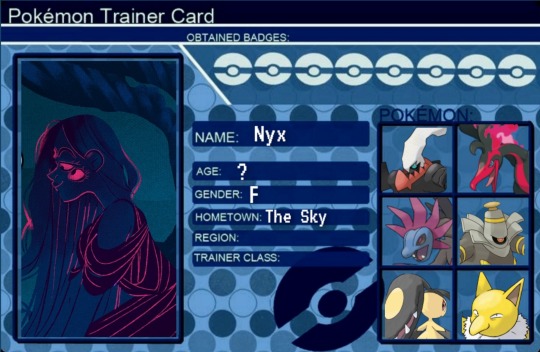
Nyx the premordial goddess of night, mother of Hypno and Thanatos. Nyx team is based around darkness and death. Darkria nicknamed Night has been by her side for longer than anyone can remember. Nyx like Darkrai are not evil, yet are feared by others. Its pokemon Saphire pokedex entry state "It can lull people to sleep and make them dream. It is active during nights of the new moon." Thus a perfect fit for goddess of night and mother of the god of sleep. Hydriegon and Glararian Moltres nicknamed Strife take after her brutal nature and those of her children. As some myths indicate that is the mother of Eris (goddess of Strife) and the Erinyes (the furies). Her Hypno a gift from her son Hypnos, while her Dusknoir was a gift from her son Thanatos. Murkcrow is eyes and ears in Olympus. Her Mawhile, Chomp is adored by Nyx due to its cunning nature. Thanatos does not like Chomp as the pokemon likes to sneak up and bite him.
Styx: goddess of the underworld River Styx
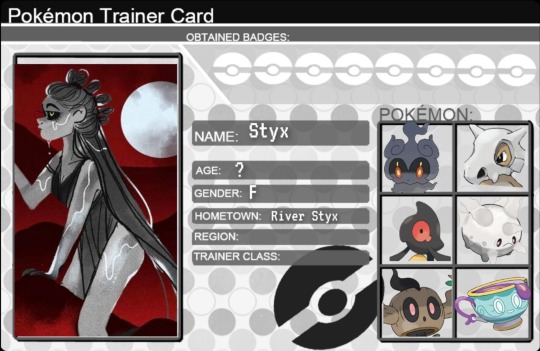
Styx is literally a river, but sense she still appears in LO, I thought she deserved her own pokemon team. It also should be noted that she "the spirit (diamon)personification of hatred (stygos)( theoi.com). Styx is filled with souls and her pokemon team is made up of almost entirely of ghost types. Marshadow is her ace and represent her more vicious nature. Her Cubone is sadly trying to find its mom among the spirits. Styx took pity on the pokemon and decieded to care for it. Along with all cubone, despite them avoiding water due to being to week to it. Yamask are also sacred to her due to the fact its pokedex states "Each of them carries a mask that used to be its face when it was human. Sometimes they look at it and cry." Phantump pokedex Y entry states "According to old tales, these Pokémon are stumps possessed by the spirits of children who died while lost in the forest." Need I say more. Her remaining pokemon include Glararian Corsola and Polteageist.
Metis: Titan-goddess of good counsel, planning, cunning and wisdom
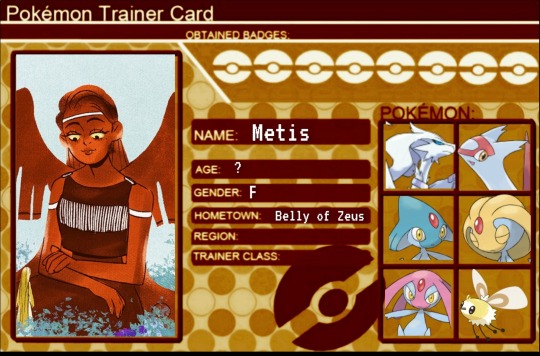
Metis poor and her team have been trapped since Zeus ate them. Before you ask yes she tried to use Teleport to get out and it never worked. Her ace is Reshiram as the pokemon "helps those who want to build a world of truth". Her team also contains the Lake Guardians: Mesprit (The Emotion Pokemon), Uxie (The Knowledge Pokemon) and Azelf (The Willpower Pokemon). All three being aspects needed to be a wise person. Metis' Latias telepathic ability helps Metis comunicate with her daughter Athena and give advice to Zeus. Although Zeus just claims he did it all himself, but no one believes him. Latias ruby pokedex entries states "Latias is highly sensitive to the emotions of people" while its saphire entry states "Latias is highly intelligent and capable of understanding human speech." Making it perfect for the mother of the goddess Athena. Rumors has it Metis and her Pokemon team taught Athena everything she knows while Athena was child inside of Zeus.
Cutiefly was the pokemon that she was pokemon she was tricked into tranforming into by Zeus. He then ate her along with the poor Cutiefly she used as reference and the rest of her pokemon team. None of Metis' team have managed to escape to Zeus on either. So they now provided her company in her tragic fate.
Helios: The God of the Sun
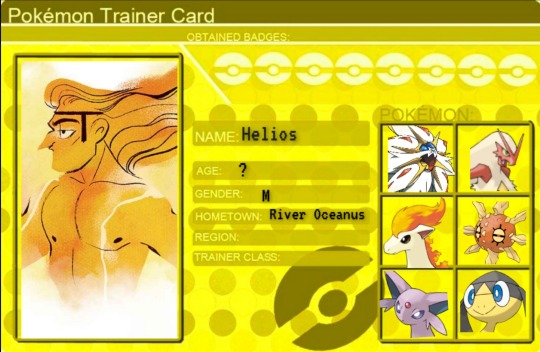
Helios team is filled with pokemon related to sun which means Solrock makes its third appearance. His ace is Solgaleo the personification of the literal sun. Helioptile is literally named after the sun, while Espeon is refered Sun Pokemon. The two also evolve due to the sun as Helioptile evolves into Heliolisk with a Sun Stone. Eevee evolves into a Espeon through level up with high friendship during the day. He also has ponyta and a Blaziken. Astreas has noted that despite is serly nature, Helios loves his pokemon dearly. His anger is partly due to no longer be able to play with them, like he did in the past. Helios used to have a Volcorona, but gave it Prometheus. As he wanted to annoy Zeus by supporting someone who went against him.
Prometheus: Titan god of forethought and crafty counsel, Creator of Mankind
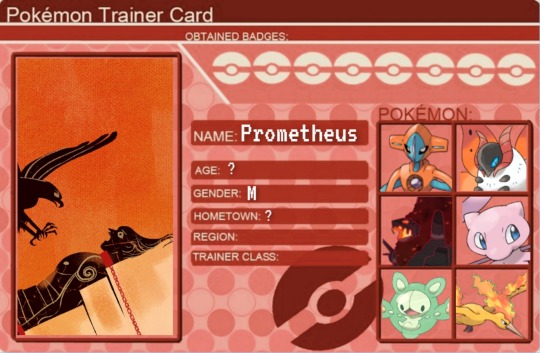
Prometheus's pokemon team was considered lost until Heracles freed them and their master. His ace is Deoxysis as it is the DNA pokemon and Prometheus was the creator of Mankind. Two other pokemon that reference Prometheus creation of mankind include Mew (the first Pokemon) and Reuniclus. Moltres is was born from the flame that Prometheus gave to humans. Volcorona and Gigantamax Coalossal are reference to how Prometheus saved the humans by giving them fire. As both pokemon having pokedex entries where they helped save people. Volcorona's pokedex entries indicates " When volcanic ash darkened the atmosphere, it is said that Volcarona's fire provided a replacement for the sun." Coalossal pokedex entry mentions that "When Galar was hit by a harsh cold wave, this Pokémon served as a giant heating stove and saved many lives." His Volcorona was a gift from Helios. Although he still confused that Helios gave him a gift as the two are not friends.
Wow I did it. This blog series has been a blast to do and I hope you enjoyed it.
37 notes
·
View notes
Text
A MYTHOLOGICAL ESSAY (TITANS)
Like many here, I love Greek mythology with its unlimited catalogue of gods and fantastic creatures. However, I've always had a problem adapting these stories. Beyond the writing of these figures which is an object of discussion in forums like these, I want to focus on a more A E S T H E T I C aspect.
Specially, about the Titans
NOW WHO ARE THE TITANS?
In Greek Mythology, the titans are the second generation of the gods (theoi) that ruled the cosmos, Cronus is the youngest of the titans when he overthrew his father, the primordial Uranus to later rule the heavens together with Rhea. To this point we know the famous story of Zeus against his father when he freed his brothers from the cage (A.K.A the belly) of Cronus and managed to defeat him and then he was sent to Tartarus.
Now my problem lies beyond its writing and symbolism, the design of this second generation of gods is a problem for me, especially in modern adaptations for the big screen and videogames. How many times have we not seen an adaptation and its design is completely "strange" to say the least?
BEHOLD THE TITANS
- God of War III (2010) -
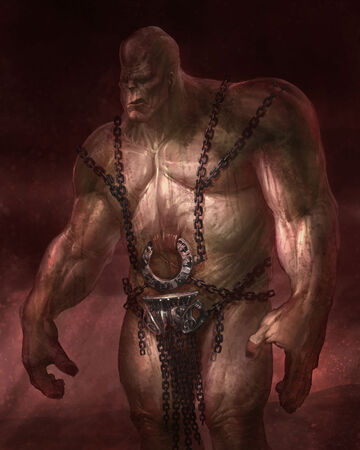
WOW, I didn't know Thanos signed with Santa Barbara Studios to work as a stuntman for these people.
- Wrath of the Titans (2012) -
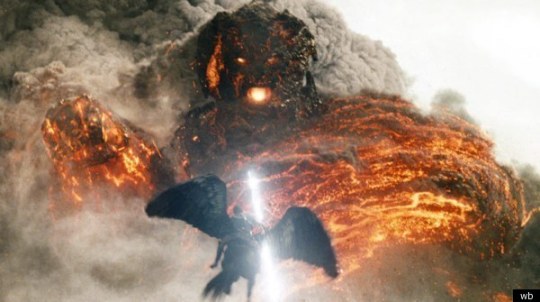
- Thank you Hollywood for making us believe that Kronos = Surtr (does not compute)
- Immortals (2011) -
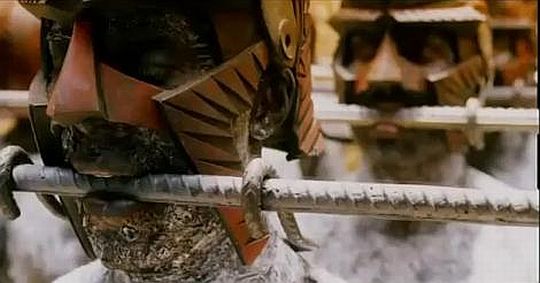
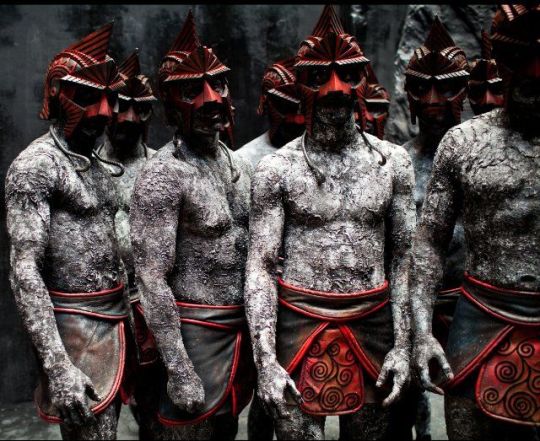
TRIVIA: Did you know that the titans had a strange kink with reinforcing bars :D (seriously, why grey?)
- Disney’s Hercules (1998-1999) -
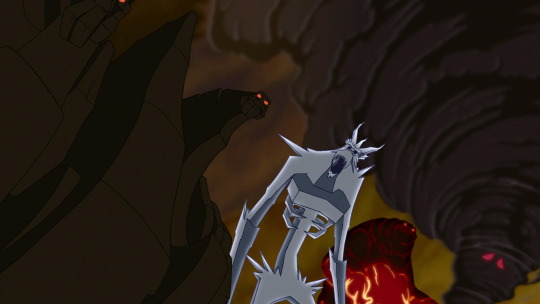
Ahhh...
BACK TO THE TOPIC
i mean, we can argue all day long that they as a representation of natural forces is normal to possess supernatural forms in comparison to their descendants the Olympians who represent the human elements of society.
H O W E V E R
I find it too convenient that only these figures have an over the top design compared to their younger generation, (Even the Primordial Gods who are the pure elements of the universe and at the same time the parents of the Titans, they don’t have this monstrous aspect, just look at Nyx and Gaia from Marvel Comics) or we have even seen sometimes how some Titans have human form (Special case, Rhea, Helios and Eos from the God of War saga)
- Gaia and Nyx from Marvel Comics -
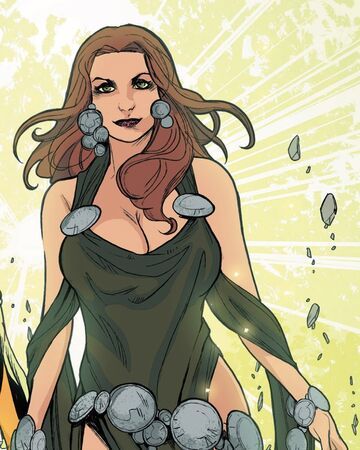
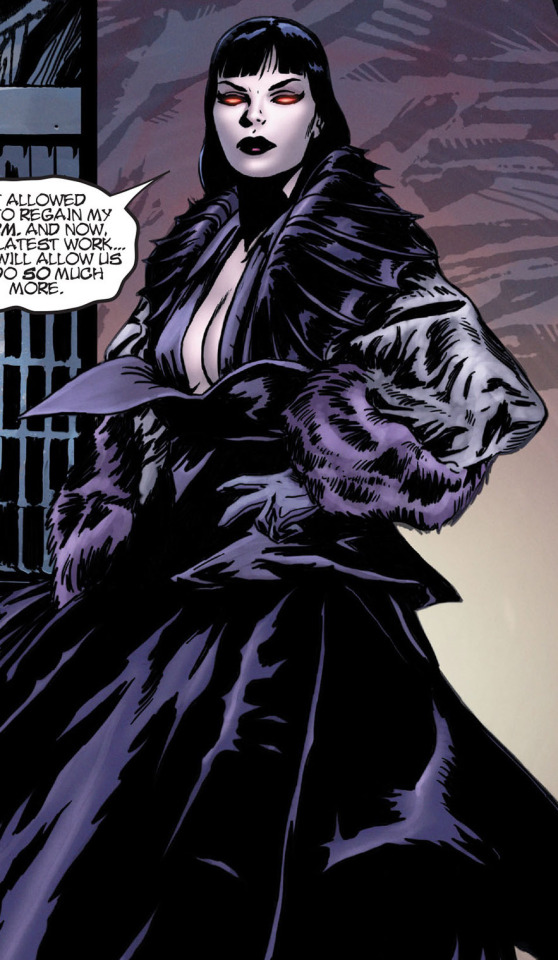
My primordial queens look better than their children... How is that possible?
- Helios, Rhea and Eos from the God of War saga -
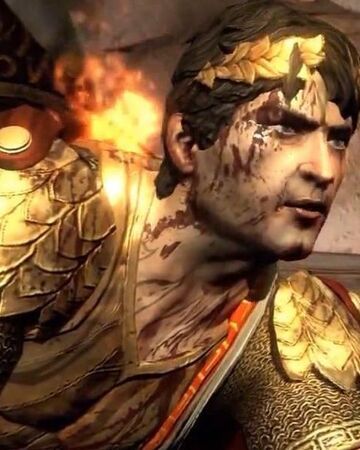

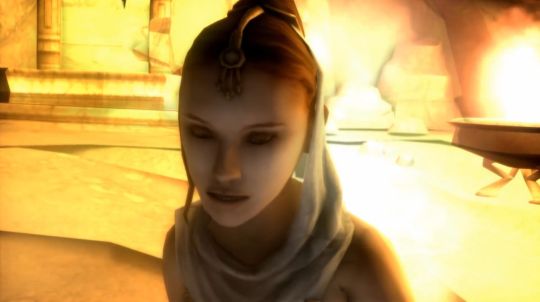
See? Designing characters like this is way better and more interesting than turning them into a generic foe as if they were taken from a Lord of the Rings bestiary.
Now, I can understand that this mistaken interpretation of these figures is due to the confusion of the Titans with the Giants (both groups are sons of Gaea who fought a war against the Olympic gods) So it’s kinda understandable that the confusion is palpable.
With all this covered there's someone who's wondering.
Is there any evidence of how the ancient greeks saw the Titans?
Fortunately the answer is YES . There is enough evidence to understand how this second generation of gods were seen by the ancient inhabitants of Greece, especially in two areas, sculpture and painting.
STATUES OF THE TITANS
- Farnese Atlas (150 B.C) -
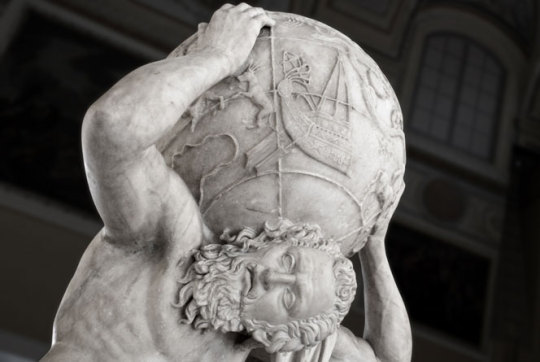
- Piece of an altar with Selene the moon titaness with either Phosphoros and Hesperus or the Dioscuri -
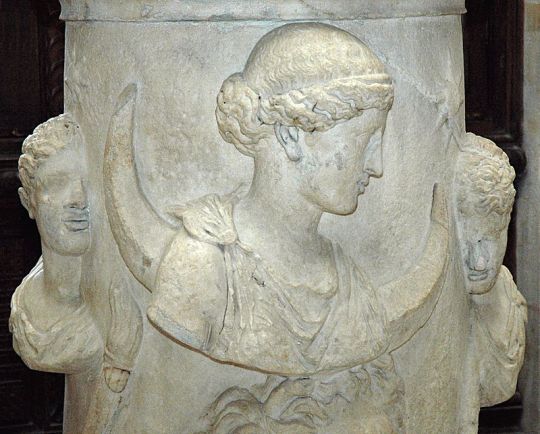
- Themis, the titaness of justice ( Chairestratos, c. 300 BCE) -
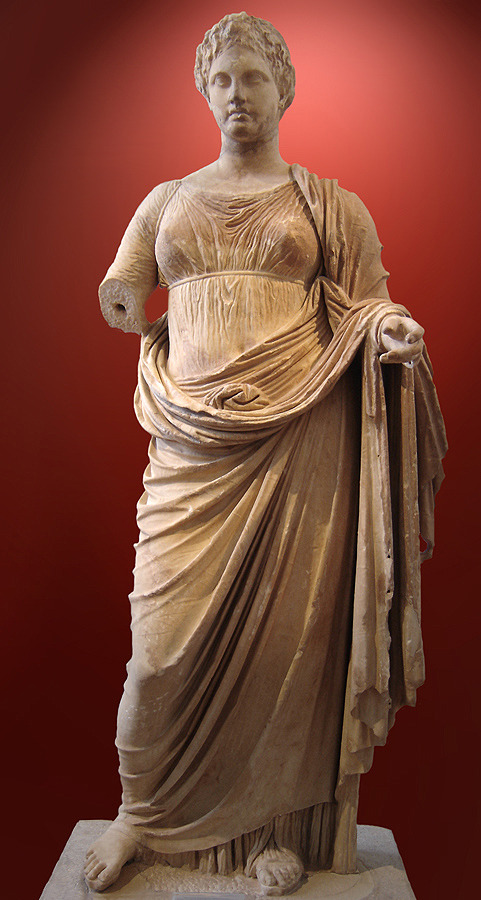
First of all, even if the former statues represent either titaness and a second generation titan (Atlas) We found no indication that these figures could be represented in a more exaggerated context.
But the most interesting part is the portraying of the titans in the old greek vase-paintings. WHY? Because the painting compared to the sculpture shows a more human focus on the gods, respecting their authority and power but implementing the qualities and defects that any mortal possesses. And the titans were not the exception when they were portrayed in this spectrum of the art.
AND THIS ARE THE PAINTINGS
- Atlas and Prometheus ( ca. 530 B.C.) -
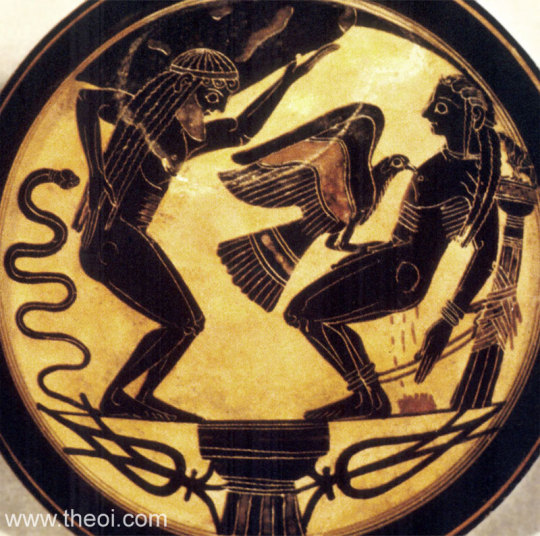
- Oceanus and Tethys (ca. 580 - 570 B.C.) -
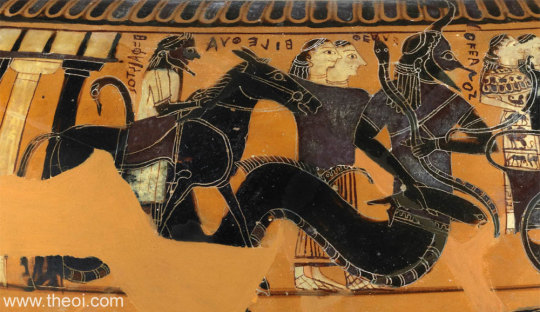
But for me, without a doubt, the most representative painting of the titans is this one.
- Cronus and Rhea (ca. 460 – 450 B.C.) -
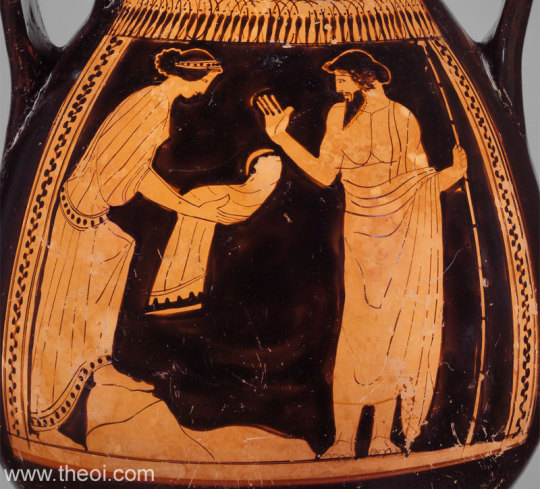
If one day I was asked about how the Titans looked like? I will show them this image.
The first time you see this painting, the first thing you can imagine is the portrait of a normal greek family, but once you know who they really are, your perspective about this couple changes, there are no elements so over the top as a giant and monstrous Cronus and a normal stature Rhea that sometimes can generate confusion in people. Perhaps in a way the ancient Greeks wanted their mythological figures not to be too far removed from human nature, so that the people could identify with their deities in the most humane way possible even if the titans were not such adored figures compared to their descendants, the point still stands.
IN CONCLUSION
Lately the stories of Greek mythology have taken a more intimate approach to the relationships with the Greek gods, the fantastic elements are still present, but that is not the main value of these stories. How these figures relate to each other on a daily basis is perhaps an example of how the Greeks saw their gods. Beyond the powers, the titles, they saw people with qualities and defects.
So, if one day there is an adaptation to the screen about mythology and the titans make their appearance, I wish they were less over the top and with more human appearances and relationships, obviously keeping their corresponding power. Just a little thought :)
Thanks for reading my post :D peace ✌️ ✌️
#mythology#Greek Mythology#mythology discourse#discourse#greek mythology analysis#greek gods#essay writing#greek myths#greek myths discourse#greek mythology meta#Greek#titans mythology#titans greek mythology#I've wanted to write this for a long time.#greek representation#God of War#Hercules#clash of the titans#Greek discourse#long post#Zeus#Hera#Poseidon#Demeter#Hades#Hestia#Apollo#Artemis#Dionysus#Hermes
119 notes
·
View notes
Text
Titanomachy: The Beginning
9000 words about the awkward first meeting of Zeus and his siblings. This takes place when Zeus releases the Olympians from their father Cronus and realize that a war is coming.
Now was the time.
Zeus was finally strong enough to face his father, Cronus, in a battle that would shake heaven and earth for a century. After years of cultivating his strength and learning the ways of the world, Metis and Amalthea felt that they had done all they could to prepare the young man to slay his father.
But he would need help.
He would need his brothers and sisters.
Zeus’s mother, Rhea, had told him countless times of his siblings being engulfed whole by Cronus, the proclaimed ruler of heaven, ocean and the earth. While it was true that they were immortal and had surely survived the endeavor, there was no way to know exactly what state they would be in once released from their dark prison.
“Hestia, she is your oldest sister,” Rhea said to him during one of their brief talks. “She is to be respected, as she has a power no others before her could ever wield. The power of flames.”
“What of the other’s?” he asked curiously. “What are the other’s like?”
Rhea’s eyes fell to the ground, as she struggled with the words, “I do not know. I was not granted the luxury of getting to know them as I did your sister. As soon as she showed her talents over flames, your father consumed her for fear of being defeated by his own progeny as he had defeated his father, Uranus. The rest he took out of my arms before they could so much as utter their first sounds of life.”
Zeus reflected on the conversation now, as he watched his mother hand the drugged laced goblet of fermented juice to his father.
What would they be like, his sisters, his brothers. Did they know the world that moved on while they lay dormant in the belly of a tyrant?
Could he convince them to be on his side, otherwise?
The act was crude to say the least when the king of all existence began to heave and gag up his supper. And though Zeus knew to expect it, the sight was no less appalling to see when the first body of a fully grown woman with long, tangled locks of walnut that stuck to her face from the wetness of Cronus's innards, no doubt. She was nude and gave a slight shiver at the chill on her damp, uncovered body.
When her radiant green eyes took in her surroundings, she looked like a frightened animal just released from a cage. Zeus felt an urge to go and comfort her, but there wasn’t time before another heave.
Another body, this one of a man with black matted hair, emerged from their father’s mouth. He wasn’t as frightened as the woman, perhaps understanding a little better by now what was happening.
They were being freed.
Another heave, and out came a woman with hair, skin and eyes the color of freshly tilled dirt. She also didn’t look frightened, but certainly confused.
Another heave, and a man emerged, this one looking unnervingly aware. His eyes as red as burning coals landed on Zeus’s and, to the young god’s surprise, the man gave a curt nod.
Like he understood what was happening, like he understood what was going on as well as Zeus himself.
A final, more violent heave and out came the only sibling Zeus had ever heard the name of: Hestia. Her smooth skin was the tone of ground sumac and her eyes and hair were as black as Nyx’s element. Unlike the others, she landed gracefully on her feet, just before turning towards Cronos. That’s when Zeus saw it, a radiation of light coming from one of her hands like she was holding a small whitish sun in her fingers.
Cronos, having been weakened by the drugs that forced him to regurgitate his devoured children, fled after spitting a curse to his wife Rhea.
He undoubtedly left for Mount Othrys to seek the aid of his fellow Titans.
The Olympians would have little time now. Decisions were to be made.
Zeus did not give chase. Instead he stood, in proud victory, over his freed siblings, though they were not the sight he had hoped to see. Though similar in structure of flesh and bone like he was, and close enough in size, Zeus was discomforted by the wild, animalistic sprawl of creatures before him covered in goo from their life giver, and masses of long, untamed wet hair clinging to unclothed bodies.
“What are we to do now?” the first woman to emerge asked, still sprawled out on the ground.
“You know what we must do, Hera,” answered the man who looked to Zeus earlier. “We have to fight.”
“But we don't know how to fight!” claimed the woman with dark features. “We barely have the strength to stand.”
Zeus wanted to speak, wanted to greet and even shake hands with the siblings he had heard so much about. After all, they were the reason he had done any of this.
He needed them.
They were his kind.
His brothers.
His sisters.
They were to fulfil this destiny of ruling the world with him, at his side. The Fates had seen it. Now they need only see it through.
Instead, his mother moved to his side, standing as all the titans did a great deal larger than he and her other children whom she hadn’t seen in such a long time. Her hand went around his shoulders and he felt her suggestion of patience wash over him.
“Hades is right.” It was Hestia who spoke this time, her eyes still watching the direction of their father, no, their captor had fled. “Demeter, I know you have fear. But we must. We have to fight.”
It was the other brother this time that cut in, standing erect and stretching out muscles that Zeus was surprised to find as well defined as his own. “We don’t have any reason to fight. We’re free now. Let’s go about our lives and be done with this. These are just politics, we’ve heard through that beast’s guts that this is just politics. I want to go find something to do, someone to do. I want to explore this world.”
“I want to fight, Poseidon. I’m going to fight.”
“Agh,” grunted the toned one.
Hades spoke up, a look of concentration on his face. “We must come up with a plan. He’s certainly gone to tell his followers what’s happened and they’ll be coming soon to slaughter us all.”
“Slaughter us!” cried Hera, struggling to stand on her thin, wobbling legs. It reminded Zeus of a newborn deer. “Then we must go, we must hide until we’re ready!”
“I can help.” All the heads turned to Zeus, which was enough to make them all go quiet. He was beautiful to say the least, dressed in a clean white shining chiton held up by a golden pin his grandmother Gaia had fastened him. All around him shone a radiance that would have made him difficult to stare at for too long by weaker eyes, but to his delight the others could take him in. His own silver eyes and wide toothy smile did little to ease the nerves of his siblings though. He realized they did not know who he was. No matter how many conversations they could have listened to, as they only knew what Cronus had seen, there was no way for them to have known Zeus was the sixth of the union between Cronus and Rhea.
“My children,” Rhea balled, walking with arms wide open towards what, to her, were miniature people. “I have longed for this day, the day that I could hold you in my arms and hear your sweet voice, a gift to mothers that I was denied!” She dropped to her knees and brought her arms around them, taking all but Zeus into her embrace as her whaling grew louder. “I have dreamed of this, I have dreamed you would be returned to me, and it is all thanks to your brother, your incredible baby brother.”
When everyone’s eyes instantly fell upon him, Zeus, for the first time in his life, blushed.
Baby brother indeed.
“And does this savior have a name?” asked the small Hera.
He smiled at the sound of her sweet voice.
She was becoming a quick favorite.
“I am Zeus.”
“How did you avoid our fate?” asked Poseidon, his brow furrowed as he stepped out of their mother’s embrace.
“I traded him with a boulder just before your wretched father tried to gobble him up,” she answered quickly, “Mother Gaia helped me plan it. Just as she and Father Sky helped plan this. The freedom of the Olympians.”
“Is that what we are?” asked Demeter timidly. “We’re Olympians. Not Titans?”
“No, not Titans,” spat Zeus. “We are better. And we will rise to better. But first, we must leave this place and devise a plan.”
“Then I suppose you could use all the help you could get, hm?”
The voice came from someone new, with a voice that was soft, tender and exceedingly feminine. Walking from the ocean that cast waves onto the rocks appeared a woman, but not just any woman.
This woman exuded an aroma of roses and salt water and flesh smooth, lightly oiled. She was draped in a sheer white linen that clung to the curves of her breasts and hips.
They all knew who she was, for the goddess needed no introduction with an entrance as show stopping as a comet crashing into the Earth.
“Aphrodite!” exclaimed Rhea, “I’m so glad you came!”
She stood between the Titaness and Olympians height, her breasts conveniently eye level with Zeus and Poseidon who had yet to tear their hungry eyes away from her ample bosom.
“I’m here with good news. Themis, Epimetheus and Prometheus said that they will join our cause.”
“You mean the Titans?” Zeus exclaimed, surprised by the alliance. “Mother, you said we couldn't’ trust any of the Titans.”
“No, son, I told you we shouldn’t ask for their aid. That is, until the time is right. And it needed to be done when, if someone were to betray us to Cronus, it would happen when we already freed your brothers and sisters. Themis and Prometheus are fine soldiers. I suppose they will do us a great good.” She turned back to Aphrodite, disturbed at the lack of names. “But what of Oceanus?” Surely her brother knew how important this was.
The goddess shook her beautiful head of burgundy curls. “He is unable to leave the seas to fight with us. But he sends his daughter Styx and her children Zelus, Nike, Cratos and Bia.”
Rhea crossed her arms, sticking the nail of her thumb in her mouth as she pondered aloud, “Yes, but will it be enough.”
It was Hestia who spoke up this time, her voice steady and well mannered as if she hadn’t spent her entire existence lost in a black abyss with her brothers and sisters. “If it’s alliances you seek, perhaps amongst your enemy is not who you need to implore. But rather, the enemy of the enemy.”
“Who do you have in mind?” asked Zeus curiously.
“Tell me, what do you know of the Hecatonchires and Cyclopes?”
“The-the Hecatonchires?” Rhea looked aghast at the suggestion. “Those monsters would do us no good, they would sooner rip us all to pieces with their hundred hands!”
“They hate your husband for hiding them away in Gaia,” Aphrodite pointed out. “They might prove a worthy ally.”
“They’re deep within Tartarus for all we know, how could we possibly find the, free them, and convince them to help us?”
“I can go,” offered Zeus. “I can do this, it’s my destiny to see this through.”
Before she could offer up an objection, the other Olympians agreed.
“You free them and we will meet with the defecting Titans,” Hestia decided. “We can begin preparations for battle by the time you get back.”
Rhea, Aphrodite noticed, looked somewhat clammy at the idea though not a word left her lips. The goddess wondered if the Titaness realized exactly what it was she had started.
A war was coming.
#greek#gods#greek gods#olympians#the sins of gods#aphrodite#zeus#hera#posiedon#hestia#demeter#the olympians#Olympus#Titans#Rhea#Cronus#Original#original writing#writing
35 notes
·
View notes
Text
IT Fandom Prompt Week - Day 4 - Medieval AU
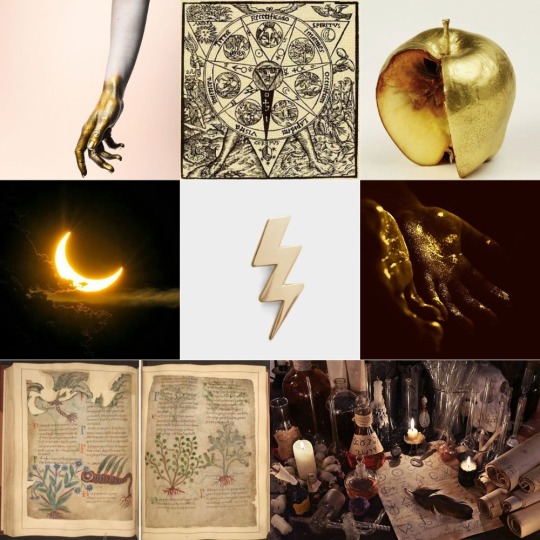
This is the first chapter of my alchemy AU that i’ve written for IT Fandom Prompt week day 4 - Medieval AU.
Read it under the cut or on AO3 HERE
@constantreaderfool @tinyarmedtrex @xandertheundead @violetreddie
IGNIS AURUM PROBAT
The earth yawned open, and out lurched Chaos.
Chaos looked around, flexed its muscles, before immediately giving birth.
Out of the womb of darkness came Gaia, Tartatus, Eros, Erebus and Nyx. Five wriggling, squishy things. The five wriggling, squishy things collectively blinked, and Chaos retreated.
From Gaia came the Titans, and from Cronus and his sister-wife Rhea came Zeus. Zeus, King of Gods, who reigned with an iron fist and wandering eyes, relished the power he held over humanity. Enraged with Prometheus for giving them the gift of fire, Zeus’ fondness for humanity waxed and waned, before ultimately decreasing to such a pitiful degree that the God’s who sat on Mount Olympus looked upon Earth with kindness in their eyes no more.
When Christianity swept over Greece in the fourth-century, and the God who were sat upon Mount Olympus were eschewed by humanity for good, Zeus’ temper grew foul. Sparks of lightning scarred the Earth in the tenth-century, Atlas adjusted his grip on the Earth, and profane things rose from the wounds.
The God’s who sat on Mount Olympus, bored and ignored, were resigned to myth and legend.
But they remained, and they watched.
Edward Kaspbrak had been plucked from the bosom of his mother at the age of two, and whisked away to the dingy alchemical workshop of one Philippus Aureolus Theophrastus Bombastus von Hohenheim (or, to Edward and his closest friends, Paracelsus) to serve as his ward and apprentice. Edward quickly forgot about his mother, who presumably also forgot about him.
The reliable constants in Edward’s early life were glass bottles, bitter smelling herbs and the lingering metallic scent in the air. His childhood was fundamentally unlike other children his age, who worked on their parents farms by day and slept, exhausted and filthy, at night. Instead, Edward practiced the transmutatory art by day, and meticulously copied out complicated spagyric formulas by candle light at night. Paracelsus’ workshop was somewhat small, and it was endlessly untidy with stacks of leather-bound books balanced precariously upon every surface. There was one small window that provided daylight and helped the poisonous vapours emitted by the various burning metals to escape the room. Other than this, however, the workshop was claustrophobic. Russet coloured clay vases littered the floor, and more than once Edward found himself tripping over them, sending the herbs he’d spent all morning carefully collecting up into the air, only to rain down like green snowflakes.
First and foremost, Paracelsus’ workshop served as the first port of call for those infected with various diseases. Whether they believed they were being punished by a vengeful God, or had a constitution that made them prone to ill-health, they would come, pay whatever Paracelsus deemed appropriate, and then spend between four and eight hours screaming in agony whilst the alchemist rubbed a slightly silvery ointment into the infected flesh, followed by a hot press of guaiacum over the infected area. Edward had grown accustomed to the howls of the infected, as they lay on the straw mattress in the corner of the workshop. Sometimes they pleaded with him to rub the ointment off with a wet cloth, or to put them out of their misery in increasingly creative, but gruesome ways. Edward never said anything to them, ignoring them in favour of mixing a new batch of quicksilver to be spread onto the skin of the next unfortunate who stumbled through the door.
The first time Edward watched Paracelsus cure the pox with the ointment made from liquid mercury he’d been amazed – half convinced his eyes had deceived him, and half convinced Paracelsus was, in fact, some sort of demonic druid belched from the underbelly of Hell.
“Edward, the body works not according to the four humours, but according to the tria prima. The three principles of life. The spagyric art should not just be applied to the transmutation of metals, but also to the great microcosm – the human body, made in His image. We can use the same principles we use to purify metals to purify the human body – to separate the pure from the impure,” is what Paracelsus had told Edward one night, whilst they were both elbow deep in a watery stew that tasted more like turnip than it did beef. Edward was not a fan of turnip.
Paracelsus must have sensed Edward’s confusion wafting over the table, because he continued.
“See, you saw how the quicksilver burnt the pox straight off Mary Croft’s arms?”
“Is that why she screamed loud enough to startle the chickens in the croft?” Edward asked.
“Yes, child,” Paracelsus laughed, “It is a rather… painful … procedure. Disease is the infection of the body by bad seeds, and we use the spagyric art to refine the spiritual essence of these seeds, so that we might expel the poison from the body and from the soul. Of course, it is all the more painful when drank as an elixir but the risk of death is too great. An ointment, though painful, is a much safer way of administering the cure”
“Does it cure them?” Edward queried, a little too quickly.
Paracelsus visibly bristled.
“Did Mary Croft walk out of here alive?”
“Yes”
“Were her blisters gone?”
“I suppose so, Sir”
“Then, as far as I’m concerned, she’s cured. Not another word”
– X –
As time passed, and he became older, one thing became startlingly clear.
Edward Kaspbrak was, by all accounts, a terrible alchemist.
On his eighth birthday – a day that did not mark the day he actually turned eight years of age, but rather, a date that marked six years since Edward had become Paracelsus’ ward – Paracelsus decided that it was time to begin teaching Edward the most basic alchemical concepts. Fortunately, his decision coincided with catching Edward with his nose in a copy of Galen’s De Facultatibus Naturalibus.
“There is more learning in my shoe buckles than in all Galen!” Paracelsus roared, smacking the book from Edward’s hand. The book fell to the floor, spine cracked down the centre.
“What have I told you about the humours, child! They are the misguided theories of irreligious heathens ignorant of true knowledge. Today we will begin your education in the spagyric art, and I will chase the Aristotelian knowledge from your head with a spear”
True to his word, Paracelsus began teaching Edward the art of alchemy.
– X –
“Try again, child. You must learn by doing, experience by the fire is the only way that you may become a true healer”
“The fire bites me, Sir” Edward lamented, rubbing the small red welt that was rapidly appearing on the webbing between his thumb and forefinger.
“That is because you don’t treat it with respect, Edward. The fire is the master of all things, and you must treat it as such. Now, try again,” Paracelsus instructed, wiping muddy brown sediment from the bottom of a swan-necked glass bottle.
The guaiacum in the metal pan simmered, and when Edward added the liquid quicksilver after bringing the pan off the heat, it spat at Edward’s hand, before solidifying into an unusable mass.
Paracelsus sighed.
“I have never seen somebody coagulate mercury before. Either you are a genius, or a fool. Again!”
Several days later, Edward found himself with nothing to do. Paracelsus was consumed by a large leather-bound book, not paying any attention to what Edward was doing, who took it upon himself to undertake some independent study.
Earnest as ever, Edward stood over the burning fire, wincing slightly from the heat, trying to turn a block of wood he had found in the workshop into … something. He was trying to simultaneously anoint the wood with the right amount of solution and heat it to the right temperature when, slowly but surely, the wood began to blacken, and pieces started to fall away in large flakes.
“Sir! Sir! I think, I think I may have done it!” Edward cried out, hopping from foot to foot in excitement, trying desperately not to let the rapidly blackening wood fall into the flames.
“Done what?” Paracelsus called out from his place at the table.
“Done… something! I have made coal!”
“From what?!” Paracelsus called out again, sounding vaguely more interested. Edward heard the scrape of the chair, and the characteristic thump of his mentors feet.
“Look!”
Paracelsus was silent.
“Sir?”
“Edward, what you have done is burnt some wood. That is not transmutation, that is not any form of alchemy, you have turned yourself into a conduit for the stove.”
“…Oh” Edward faltered, dropping the wood and watching the fire consume it hungrily.
Paracelsus must immediately sense his student’s disappointment, because he immediately steps forward to console him.
“The spagyric art is a fickle one. She will not be mastered by anyone who, on a whim, decides to try and tame her. You must practice. You must feel the force of all the great men who have stood before you, and channel that energy into your studies. I have faith in you, Eddie.”
– X –
Ten summers later, and Edward was eighteen years old and no better at the spagyric art than he was when Paracelsus had begun his education. Edward had been resigned to the position of aid, a status normally reserved for women. He prepared the ingredients, scrubbed the vomit and blood from the floors, and mostly, just stayed out of the way. When his education had stagnated, he had expected Paracelsus to turn him out of the workshop, and condemn him to a life of poverty. But that hadn’t happened. Over the past fourteen summers, Paracelsus had grown rather fond of the rather useless, but sincere boy. He’d watched Edward mature into a kind-hearted earnest young man, and despite his failure to turn base metals into gold, his heart appeared to made of the stuff. Besides, turning Edward away would require training up a new aid which was, quite frankly, too taxing. So Edward remained under the tutelage of Paracelsus, despite never actually applying his theoretical knowledge beyond mixing up the ointments.
Until Richard Tozier walked into the workshop.
– X –
Richard Tozier had the pox.
He assumed he’d caught the pox from one of the women he’d met at the tavern. This is what he told his parents. In reality, Richard knew he’d caught it from the young man he’d been secretly lying with for half a year. Announcing to your mother and father that he’d caught the pox from the local sodomite wouldn’t endear him to his parents any more than his alternative story, so he stuck to that. They wailed and lamented about divine retribution and how his mortal sins were manifesting on his skin. They, of course, send him off to the nearest healers as quick as his pock-marked feet would carry him.
That’s how he found himself standing outside the alchemists workshop, hesitating briefly before landing three swift, sharp knocks on the rickety door.
It opened almost instantly.
“Hello? Can I help you?”
The owner of the voice was small, male and inextricably beautiful. Richard knew that he wasn’t supposed to find men beautiful, and that God must have made a catastrophic error when creating him, but he didn’t much care for convention.
“Uh – Yes. Yes, I’m looking for the healer? The – the alchemist? My body is entirely covered with–”
Richard gestured to his skin, the angry red welts on his skin practically pulsing on his otherwise unblemished skin.
The young man’s eyes widened, before he schooled his face into something Richard assumed was supposed to be apathy, but still looked more like panic than anything else.
“The alchemist is not here presently. You will have to come back another day, when he’s here, which he is not right now, I mean – he isn’t here to help you, you will have to come back”
The young man tried to wedge the door shut in Richard’s face, but Richard managed to stick his leather-clad foot out in time, so that the door could not completely shut.
“Excuse me, but I really must insist that you help me. I cannot go home before I am cured, for I fear that my father would beat me with a rather large stick if I did. Can you not help me? Who are you? Are you the apprentice?” Richard practically begged, nudging the door open slightly by wiggling his foot.
“I suppose I am, technically, but I really cannot – I have never – I have never successfully cured anyone, not on my own. I don’t think I can do this on my own, you really must wait for Paracelsus to return”
“I fear that I might drop down dead on your doorstep. Is that what you want? To have to step over my melancholy, rotting corpse to leave your house? To drag it to a shallow grave, to have to cover my body with–“
“Enough!”
Richard smiled wolfishly, watching the young man’s face contort into a picture of disgust.
“So you’ll help me?”
“I suppose I must”
“There really is no risk, I’m practically dead already.”
– X –
The concoction of herbs and water in the small metal pan bubbled furiously, and Edward’s forehead glistened with a panicked sheen of sweat. He had scrabbled around the workshop hunting for the vial of liquid quicksilver, before finding one lodged in the centre of an old book that Edward had watched Paracelsus pour over night by night, etching complicated alchemical symbols that Edward didn’t recognise into it with a quill. Wiping his forehead with the back of his hand, he looked up at the stranger who was currently sat on the straw mattress. The room was full of thick grey smoke, and the bitter-sweet aroma of burning plant matter. Pouring the solution into a glass bottle, Edward closed his eyes prayed that the cure would work. He had seen Paracelsus anoint hundreds of people with the solution, and he was confident that he could brew the solution with his eyes closed. However, his hands still shook as he carefully brought the small glass bottle over to where the stranger sat.
“My name is Edward, what is your name, Sir?” Edward asked, trying to maintain a strong steadiness in his voice, and only just succeeding.
“Richard Tozier, but my friends call me Rich. You can call me that, if you like”
“So, Richard, have you ever had a quicksilver ointment applied to your body before?” Edward pressed, collecting pieces of somewhat dirty rag that he would use to press the ointment into Richard’s bleeding skin.
“I have not. Why? Am I in for a pleasant surprise?” Richard asked, tone too light-hearted to suggest that he knew what he was about to experience. Edward wordlessly tugged at Richard’s tunic, and Richard tugged it over his head, exposing his torso that was also littered with red welts.
“Not entirely” Edward hummed, pouring some of the foul smelling ointment onto the rag, hesitating for a second, before bringing it to Richard’s skin with an audible gulp.
As predicted, Richard howled like a struck cat.
“Keep still! Sorry – You must keep still, the application process is precarious and it’ll hurt even more if I wipe this on your uninfected skin” Edward snapped, but smoothed the hand that wasn’t holding the quicksilver over Richie’s trembling arm.
“Sorry, sorry. This hurts like nothing I have ever experienced before, and my father dropped me on my head when I was a child” Richard replied, wincing, causing Edward to laugh, loud and bright.
“Ah, that explains why you are … the way you are”
Edward continued to dab the quicksilver ointment onto Richie’s welts, concentrating hard enough that he feared his eyes might pop in their sockets. Richard was almost entirely silent, save for the occasional hiss and whimper. At one point, when Eddie rubbed the ointment on a particularly painful looking welt on Richard’s inner thigh, Richard grabbed Edward’s arm.
“Is this … okay?” Richard asked tentatively, flexing his grip on Edward’s bicep. Edward considered removing the man’s hand, wary of the fact that Paracelsus could walk back in and see his apprentice sat on the floor, between the legs of a pock-marked man, and throw him onto the street in a heap.
Edward didn’t move his hand.
Slowly, and with painstaking precision, Edward continued to apply the ointment to every scab on Richard’s body.
“You’re very quiet, little mouse”
“Mouse?! I am no mouse” Edward cried, sitting back on his heels.
“Well, you have tawny hair and a small nose and I’m sure if I poked you here,” Richard reached over to Edward’s side, giving it an almighty poke and causing Edward to shriek, “Ah yes. You squeak, Sir, exactly like a mouse”.
“I am not a mouse” Edward replied indignantly, but try as he might, his lips twitched at the sides, threatening to bloom.
“Well, what are you then?”
“I am,” Edward paused, before replying, “I am a fox”
“A fox?! Are you cunning, then? Wily and tricksy?”
“I suppose so. I have a vicious bite, so you better be careful or I’ll –“ Edward announced, and gnashed his teeth together, simultaneously a threat and something … different. Something entirely more.
“A vicious bite? Is that a promise?” Richie queried, but the wink he tried to aim at Edward mutated into a scowl as the quicksilver was applied to a scab on his shoulder.
A blanket of quiet settled over them. Edward continued to apply the ointment, and Richard watched him work. After a while, Richard grew tense.
“Edward, can I tell you something?”
“Um, I suppose. What is it?”
“It’s something that you might find repulsive”
“By God’s name, if you ask me to apply this ointment to your …,” Edward gestured vaguely at Richard’s crotch, “I shall force it down your throat”
“…Oh”
“So you were going to ask me to do that?”
“No, well, no I wasn’t but it was … somewhat related”
“Somewhat related to your…,” Edward gestured at Richard’s crotch again, feeling his cheek grow hot with embarrassment.
“No it’s related to me asking you to. It’s – oh, to hell with it, I do not only lie with women”
“Pardon?”
Richard sighed, shifting slightly on the mattress.
“I do not only lie with women”
Edward didn’t say anything, just let Richard’s words hang in the air like low flying birds.
“I lie with men. I like lying with men. It’s … different. In some ways, much better, it’s –“
“Why are you telling me this?” Edward interrupted.
“Because I am probably going to die, and this secret has been consuming me for weeks and … if I didn’t share it with someone I fear I might go mad”
“But why me?”
“Let’s just call it intuition, little mouse”
– X –
“How long have you been an alchemist?”
“I’m not … I’m not technically an alchemist, for I – It’s complicated, Sir”
“Sir?” Richard quoted, eyebrow raised comically high on his forehead.
“Sorry, force of habit. Paracelsus instructs me to call the patients ‘Sir’”
“Hmmm” Richard hummed, his eyes glinting mischievously, looking ever the trickster.
“What now?”
“I rather like it when you call me Sir”
Edward spluttered then, almost dropping the bottle of ointment. Richard reached out to steady his arm, causing Edward to flinch even more.
“Are you feeling okay, Edward?”
“You are a nightmare, Richard” Edward cursed, but the smile that had fully bloomed on his face suggested otherwise.
– X –
The first time Edward had realised he was different he’d been sitting outside the workshop. The summer sun tingled on his skin, when Robert Greatrakes, the mason’s apprentice, had walked past without a shirt on. He was tugging a small wheeled cart loaded with stones, and Edward’s eyes remained glued to the young man’s body the entire length of the street. The way the muscles of his arms were taut under the strain of the cart. The glossy sheen of sweat covering his back. The way his hair, cropped close to his skull, glistened like molasses.
Something bubbled in Edward’s lower stomach.
He knew what this was. What he was.
– X –
With the ointment applied to every inch of Richie’s inflamed, oozing skin, all they could do was wait. Eddie busied himself cleaning the tools he had used to brew the ointment, as well as carefully replacing the vial of quicksilver into the book where he found it. He hoped that Paracelsus would not notice that it was missing several inches of glittering liquid. Richard is snoring loudly in the corner of the room, body entirely covered in a thin white sheet, with the intention of insulating his body to stimulate the ointment. Still staring at the snoring stranger, Edward absently picked up the glass bottle that had previously contained the quicksilver ointment.
He dropped it.
The bottle splintered into hundreds of tiny glass shards, and Edward flinched, expecting the ointment to have oozed all over the wooden floor.
It hadn’t.
What lay on the floor was a smooth, smallish round lump of what appeared to be solid gold.
Breath clogging his throat like wool, Edward bent down and picked up the small round object. It was entirely solid, and when he tried to crush it in his fist, it didn’t change shape.
Gold.
Edward had created gold.
He hadn’t meant to, of course. It had been a fortunate accident, and should Paracelsus, or indeed anyone, have asked him to re-create this feat he’d be unable. Nevertheless, he had done it. Gold from quicksilver. The ultimate aim of the spagyric art. He had done it.
Richard coughed, and Edward dropped the ball of gold. It rolls under the table.
Suddenly remembering how the gold had come into existence, Edward scrabbled over the vases and pots on the floor until he was standing directly over Richard, who, thankfully, looked normal. He was breathing, the steady, rhythmic puffs of air providing the only sound in the room. His face was somewhat dirty, but otherwise exactly the same as it had been when he’d first come into the workshop.
With shaking fingers, and shaking breath, Edward picked up the corner of the white sheet between his thumb and forefinger, and pulled it back gingerly.
The shriek that clawed its way out of Edward’s mouth practically shook the walls of the workshop.
Richard’s body was entirely covered in small crescent shaped gold marks. Where there had been angry red welts, there were now perfectly even, perfectly repeated gold crescents and Richard’s body was absolutely littered with them. Richard sat up with a start, pressing both hands onto the straw mattress, and suddenly, without warning, Richard was sitting on a solid block of … Gold. It was as if the mattress had always been gold. There was no evidence to suggest that this obscenely large golden cube had ever been made of cloth and straw.
“What – What on Earth … Edward? Edward, what is going on?” Richie demanded, voice quivering as he stood up gingerly.
Edward couldn’t move, couldn’t breathe, couldn’t claw his eyes away from the solid gold mass on the floor and the young man stood in front of it, body shining like an angel.
Richard didn’t appear to notice that he was covered in small golden marks, and Edward couldn’t open his mouth to tell him.
“How … How did you do this? Turn the bed into … gold? The bed is … solid gold? Mercy God, Edward, who are you?”
“Your – your arm, Richard, look at your arm”
“My arm? Never mind my damn arm, look at the – by God’s blood, what has happened to me? What have you done to me?”
Richard was now staring at the gold marks on his arm, face stricken with horror. Edward immediately decided that he’d have to delay Richard, just long enough that so he’d still be here when Paracelsus returned. Paracelsus would know what to do, he’d be able to fix this … whatever this was.
“Richard, you must – you must wait until the alchemist gets back. He will not be long, he is just in the next town. He’ll know what to do, what has happened to – to you. Please sit, please, Richard, I do not want you to panic, I –“
“Hell’s breath! You don’t want me to panic? Pray tell, how am I not to panic when I am covered in these … marks? What have you done? Cursed me? Is this a curse, for – for being a sodomite? You did not have to curse me, vile witch, just refuse to treat me and let me die in a heap like I should have done”
“No!” Edward cried, a hoarse, harsh sound that echoed around the room angrily, “That could not be further from the truth, Richard – Rich, please. Wait, sit. The alchemist will be back soon and he can help you”
Richard grabbed the broom that was lying against the wall of the workshop, and attempted to wield it like a weapon – to protect himself from whatever he assumed Edward was going to do to him. What actually happened, though, was as soon as Richard picked up the broom, it immediately turned to solid gold. Wooden handle, horse hair bristles and all. Completely, and perfectly, rendered in solid gold.
Richard screamed, and dropped the golden broom on the floor, where it landed with a loud clatter.
“By God’s bones, what have you done! You have turned me into some sort of … demon! Stay back, stay back or I’ll send you crawling back to hell, I’ll – I’ll … !”
Before he could finish his sentence, Richard Tozier, cradling his hands against his chest, ran out of the workshop.
– X –
Midas.
The name shot into Eddie’s head like a cannon ball, fast and painful and … Oh.
Midas.
Edward was scrabbling for the copy of pagan mythology on the top shelf of Paracelsus’ bookshelf when he alchemist walked back in.
“Edward? What in God’s name are you doing?”
“HELL!” Edward cried, toppling to the ground from where he was perched on the edge of a bench, the book of pagan mythology clasped tight in his hands.
Paracelsus rolled his eyes fondly, before striding over to where his apprentice was sprawled on the floor. Edward gratefully accepted his extended hand, and Paracelsus hauled him to his feet.
“Care to tell me what required this book so urgently, Eddie?”
Edward had no idea where to start.
Luckily, before he had a chance to speak, Paracelsus noticed the rather inconspicuous golden bed in the corner of the room. The mattress that had once been straw and thread-bear cloth.
“Edward,” Paracelsus said reverently, “Did you … Did you do this?”
“Yes” Edward replied, miserably.
“How?”
“Someone came in while you were out and they – they had the pox and they were so desperate for me to cure them and – and I … I did”
“That doesn’t tell me how the mattress became golden, Edward”
“I couldn’t find any quicksilver at first, but then I remembered the vial you were keeping in the manuscript you’ve been working on, so I … I took that and I … “
“You used … the quicksilver I’ve been keeping in this book?” Paracelsus exclaimed, holding up the leather-bound manuscript. The little vial of quicksilver that Eddie had used rolled out, landing on the table below. It stared up at him.
“Yes”
“Oh, Child… do you know what this is?”
“Quicksilver?”
“This,” Paracelsus held up the vial and shook it slightly in Edward’s face, “This is not just quicksilver. This is the most potent, most volatile form of mercury possible. It will turn almost any base metal to gold. And now, it appears, even materials that are not metal to gold. What happened to the patient, I assume they died? What did you do with the body?”
“Well –”
“And you really must be more careful, Edward. You must have spilt a very large amount of the ointment for the mattress to entirely turn to gold like this”
“Sir!”
“Yes?”
“They didn’t die”
“They didn’t?”
“No and I … I didn’t spill any of the ointment”
“You must have, for how else would …. Oh. Oh, Edward. What have you done?”
Paracelsus ripped the pagan mythology book out of Edward’s trembling hands, and thumped it down on the table. The alchemist flicked to the relevant page, and began scanning the Latin.
Midas, King of Phygia, was unsatisfied. He had riches untold, a great castle, and a beautiful daughter. Despite all this, he still wanted more. More wealth, more gold, more jewels. Midas would spend his days counting his gold, ensuring it was all still there. His greatest love, his greatest passion, his reason for living, all gold.
One day, Dionysus, God of revelry, was travelling through Midas’ kingdom. One of his fellows, Silenus, took a nap in Midas’ rose gardens, unaware that the King took early morning walks in the garden. Sure enough, the King found Silenus, and invited him in to feast at the castle. After the feast, Midas took Silenus back to Dionysus, who was so grateful for the safe return of his friend, he promised to fulfil Midas’ greatest wish. Immediately, Midas decided that he desired everything he touched to become gold. Dionysus pleased with the King to think about the consequences of his wish, but the King demanded that his wish be fulfilled. Dionysus resigned, and promised that from the next day, everything that Midas touched would turn to gold.
“So?” Edward fretted, “What does it say?”
“I think, my dear boy, you gave this patient the Midas touch”
“I swear on my own life that it was an accident”
“I know, I know. Without being needlessly cruel, Edward, you are not skilled enough to have done this on purpose”
“What happened then?”
“I fear that … I fear that someone, or something … intervened”
Edward started to panic.
“What do you mean, something?”
Paracelsus clicked his tongue, a well-practiced indication that Edward was not to push his mentor.
“Do not let that concern you, child. You let that concern me. Now, who was this patient?”
“His name was Richard”
“Richard? It wasn’t the Tozier’s boy, was it?”
“I’m not sure sir. He had wild curly hair and squinted a lot, if that sounds familiar? He also had a rather … peculiar sense of humour”
“Ah. Has to have been the Tozier lad. Now, Edward, what I need you to do is go and pay a visit to the Tozier’s and ask Richard to come back to visit me. I’ll have to – I’ll have to try and cure him, I suppose”
“Only try?”
“Well, as much as I am the greatest alchemist this side of Europe, I cannot perform miracles. Now, go and get the boy and I’ll try and correct your mistake.”
“But –”
“Go! Before I chase you out with –“ Paracelsus reached for the broom that was stood behind the door, “This rather magnificent golden broom. Shoo!”
Edward ran.
#eddie kaspbrak#richie tozier#Richie Tozier x Eddie Kaspbrak#long reads#alchemy AU#medieval AU#itfandomprompts#it fandom prompt week 2019#TW: Slur = this fic uses the word 'sodomite' twice#so pls be careful if that word triggers you
33 notes
·
View notes
Note
12 titans headcanons please ❤️
yes ❤️
❤ warning: this is gonna be a very long post ❤
OCEANUS
Oceanus is the oldest of the Titans, and i really like the idea that he grew to adulthood within a day of being born.
i think i've mentioned this in some Gaia hc's previously, but i don't think that Gaia had any of her children in the "conventional" way that we're used to.. as in, none of her children were actually formed in her womb- instead, i imagine that she and Ouranos only had to place their hands on the Earth to cause their children to be born.
for the Titans in particular, i like the idea that Gaia caused a field of flowers to bloom, and within 12 of them were each of the Titans.
Oceanus bloomed first, and was named by Gaia (i think he's the only one who was actually named by her, herself- more on this later).
we know that Ouranos never cared for his children, so i think that the 12 Titans were originally born so that they could help Gaia take care of the Earth,, thus allowing Ouranos and Gaia to spend more time with each other.
so when Oceanus was born, he had to grow quickly so that he could take care of his siblings and raise them (Ouranos wasn't about to let Gaia go "wasting" her time taking care of children).
Oceanus builds the first village, and his primary motivation in everything he does, is to take care of his siblings.
i think he's very paternal,, though he doesn't like to show it.
Oceanus is very stoic as well... he hates brash decisions and always takes his time to think about things before he says something or does something.
also, in Gaia's absence, i think he named all his siblings, and i think that although all the Titans refer to him as their brother, they also have the understanding that Oceanus has been more of a parent than either Gaia or Ouranos, and they all look up to him a lot.
Oceanus isn't cowardly, but i don't think he likes fighting. he would much rather preserve the peace at the sake of his own freedom, than have said freedom but at the price of blood being spilled.
that said, he could definitely pack a punch if he chose to.
related to Oceanus’ unwillingness to fight, i think this is an important factor in why Cronus (who is the youngest) becomes King instead of Oceanus (who is the oldest).
technically, it’s Oceanus’ birthright to become King after Ouranos, but Oceanus doesn’t possess the qualities required to be a good king, and he knows it, which is why he never challenges Cronus’ authority or tries to take the throne for himself- he is absolutely okay with not being king, in fact, i think he’s grateful for it.
TETHYS
Tethys is, as the lore states, Oceanus' wife, and i think she's always been really close to Oceanus- the only one who truly understands Oceanus' deepest feelings.
since Oceanus doesn't really show much emotion physically, i think it's sometimes difficult for the other Titans to know exactly what he's thinking, but Tethys is very intuitive and understands Oceanus quite perfectly.
i think Tethys is slightly more energetic than Oceanus, but she's still the most quiet of all her sisters.
she too, prefers not to fight if she doesn't have to, but while Oceanus will wait for the very last opportunity to fight, i think Tethys can be persuaded to make a move earlier than she usually would.
i also think she's more adept at fighting than Oceanus.
when Oceanus and Tethys are referenced in poems and plays, they are usually described as the "primeval parents", and are often referred to as the "genesis for all" which i think is really cute, and although Tethys isn't the goddess of motherhood, i definitely think she's very maternal (i mean, she has 3000+ children, so we hope so, right?).
after the Titanomachy, it is said that Oceanus and Tethys became Hera's foster-parents, so i imagine that Tethys and Oceanus opened their home to many gods and goddesses, even if they were simply passing through.
Hera, in particular, i think had a closer bond with Oceanus and Tethys than with Rhea- and that of course is no fault of Rhea's, i just think that's how things happened.
everyone talks of this idea that Zeus would go around pestering Oceanus and Tethys when he was trying to court Hera, and i like that idea as well ^_^
i think Oceanus was particularly reluctant to let Zeus be with Hera because Oceanus has had sooo many daughters who have been effectively abandoned by their husbands (see: Metis, Asia/Clymene, Hesione, Eurynome, etc.) and he doesn't want that to happen to yet another one of his kids.. but Tethys, the sweet voice of reason whom Oceanus has a hard time saying "no" to, intervenes on Zeus' behalf perhaps because she sees something more in Zeus' proposals, which is why Oceanus finally concedes and allows him into his house.
CRONUS
now this guy >:)
i've said it before, but i just really really like the idea that Cronus is the epitome of "you either die the hero, or live long enough to see yourself become the villain".
before i said that Oceanus grew to adulthood within a day because he had to take care of his younger siblings, and following this logic, i think some of the younger Titans took more time to grew simply because there was no need for them to grow up quickly- they were going to be taken care of.
as the youngest, i think Cronus takes the most time to grow.
most of his life, his siblings are ordering him around which i think gets to him a little, so of course, Cronus has always been a little bit mischievous and a little sneaky.
i think he gets along really well with Iapetus. they are “terror twins” as Oceanus calls them, and as children, they would always get up to no good.
in terms of morality, i think initially, he’s actually quite sane and level-headed. he understands that war is brutal and should be avoided if it can, but he also understands that sometimes war is necessary. this is what makes him, initially, a good king- because he understands the need for balance.
but,, after sometime, i think he goes insane with Ouranos’ prophecy and he convinces himself that murdering his children is just a part of the job- it’s his duty.
i like the idea that Cronus sees himself first and foremost as King. being a husband and a father is second to kingship.
i always wondered what makes a man go so mad that he’d eat his own kids, especially after he literally deposed of his father for doing effectively the same thing- why would he willingly follow in the footsteps of the god he hated so much? well, i think it’s because Cronus is driven by this philosophy of being King before being anyone else.
he believes that it’s his job to protect the world, the way he did that first time when he rallied his siblings together to fight Ouranos. Cronus believes that his children are going to ruin the world and destroy his siblings, and he loves his family and the world too much to let that happen,, and if he has to choose between his children and the world that he has sworn to protect, well, as King, isn’t he obligated to choose the world?
and after that, he just goes downhill, and i think he loses sight of the bigger picture, and becomes the villain.
also- not relevant to the core of this section but i just wanted to talk a little about Philyra, the mother of Chiron by Cronus ^-^
so in the original myth, i’m pretty sure that Cronus and Rhea are still married when Cronus and Philyra get together,, and that’s why when Rhea catches them and gets pissed, Cronus panics and turns into a horse (which is why Chiron is half god, half horse- lololol Cronus, you absolute loser).
anyways, i love the myth because it’s funny, but i don’t like the idea that Cronus was actually cheating on Rhea- i mean, first you eat her children, and now you’re cheating on her?? c’mon, have some tact!
so i have my own little take on it, and that is that Chiron is born after Cronus gets disposed (so when Rhea and Cronus are pretty much divorced).
i like the Orphic version of events where Cronus gets sent to Nyx’s cave, so following from there, i imagine that Philyra must have somehow helped Cronus escape from Nyx’s cave (probably because she was manipulated by Cronus),, and when they escaped, they came to Mt Pelion, which coincidentally, is where Rhea, now happily retired, lives.
so that’s how Rhea accidentally discovered her ex-husband’s affairs (which is in line with the original myth where Rhea catches them).
of course, i don’t think Cronus ever cared about Philyra to begin with, i think he was just using her because i don’t think the “player” archetype suits Cronus- he’s not a romantic, that’d make him too similar to Zeus, and the last thing Cronus would want would be to be like his son.
anyways so where does Chiron’s equine nature come into my version of events? well, running from Nyx’s cave to Mt Pelion on foot sounds a little tiring, but luckily, Cronus is a god and can therefore turn into a stallion, so he and Philyra probably ran away like that.
i don’t think Cronus ever actually knows about Chiron. Philyra, in the myths, is ashamed about Chiron’s appearance (which is really rude and mean), so she abandons him, but i like the idea that she simply wasn’t ready to be a mother, much less a mother of a child born from a war-criminal, so she instead leaves Chiron on Rhea’s doorstep. and Rhea recognises immediately who Chiron is, but she’s the goddess of motherhood so she adopts him, until Apollo comes in a few days later and decides to take Chiron. anyways, so that was a little bit of a tangent but i just wanted to share that ^-^
another thing- i know we all like to make jokes about Cronus seeing children as good for only one thing- snacks- but in all seriousness, i don’t think that was the case. i’ve said before what i, personally, think his real motivations behind consuming his children were, but i don’t think he was averse to the concept of children and having a family entirely.
ok, i have to divert to the story of Prometheus to explain myself here, but bear with me for a sec- so Prometheus gets punished because he helps the humans- but why does he help them? why does he love them so much and why does he feel sorry for the way they’ve been treated by Zeus?
well,, we know that Prometheus was alive during Cronus’ reign. and during Cronus’ reign, Cronus made the Golden Age of Man where mortals lived in peace and harmony, free from interference by the gods, where no one did the “wrong” thing, and life was great. so couldn’t it be that Prometheus had seen what life for humanity could have been like?
my hc is that Prometheus had seen what Cronus had done for humanity and was appalled by what he now saw under Zeus’ rule.
so what does that have to do with Cronus and children? well, i like the idea that Prometheus grew up in the palace, and he had known Cronus all his life. i like the idea that Cronus actually spent time with his nephew, and was the one who first introduced Prometheus to the mortals. i think Prometheus and Cronus actually were rather close as uncle and nephew. so,, i don’t think that Cronus hated all children,, he just didn’t think he could have any of his own.
RHEA
Rhea is one of my favourites <3 i think she’s one of the cooler Titans.
i think her personality is defined by her courage, and her ambition- in fact, i’d call her the most ambitious of all the Titans.
as a young Titan, i think she got along best with Cronus and Iapetus, and i think she actually had a bit of a mischievous nature, similar to them. i think she enjoys pranks and good jokes.
she’s the kind of goddess who would do anything on a dare (i think she was pretty wild, and maybe a little shameless, in her youth, much to Oceanus’ distress).
in saying that, i think Rhea has also always been very headstrong. she’s not arrogant, or rude, but she if she has opinions, she will make sure you’re aware of them. you don’t have to agree, you just have to understand her point of view.
she’s also a little spitfire (a little like Hera tbh), and she is very good at fighting ^-^
but, Rhea is also incredibly kind and forgiving. considering what she goes through during her marriage, i think she is remarkably strong. while Cronus goes insane, Rhea remains standing tall- she survives Ouranos’ rule, Cronus’ rule, and is alive to witness Zeus’, and she is never on the losing side which is a testament to her character and strength of mind.
in the previous section, i said that Cronus follows the philosophy of “King first, husband/father second”, but i don’t think Rhea agrees with this at all.
there is never any way for her to justify to herself that her children needed to be killed- it’s a horrible and messed up idea and it’s honestly a wonder that she didn’t go insane after it happening to her children five freaking times.
i think that what makes Rhea a good queen is that she doesn’t work in absolutes- see, Cronus believes that either the world is saved, or his children are saved, but not both- but Rhea, who is always driven by courage and hope, believes that it is possible for the world to have peace and for her children to also be alive.
where Cronus is an architect of plans, and an executor, Rhea is the thought-process- the one who thinks things through carefully and evaluates the effects of the action... she’s more level-headed, and she doesn’t get angry easily.
after Cronus is deposed, i like the idea that Rhea remained on the throne a little longer- Zeus was simply too young to be allowed free reign immediately, so she kinda pulled the strings behind the scenes.
i don’t think that Rhea has favourites amongst her children. i think she is very protective of all of them and she loves them all very much, but i think the one she finds most difficult to get along with is Hera, maybe because Hera is the most similar to her (which is why Hera spends more time with Oceanus and Tethys than Rhea).
there are versions of the courtship of Zeus and Hera where Zeus and Hera keep their relationship a secret from Rhea because Rhea will disapprove of it, and i do like this version of the myth because i think it makes sense. i think Rhea has some fear that Zeus will repeat the mistakes of Cronus and Ouranos, and she doesn’t want Hera or Zeus, for that matter, to be hurt the way Rhea was hurt.
we know that Zeus had already swallowed Metis, so Rhea believing that Zeus could become like Cronus isn’t too hard to believe.
speaking of the Zeus x Metis myth, i don’t think Zeus swallowed Metis intentionally. i think that, at that time, Zeus was still incredibly young- he had only recently defeated his father, and was still finding his way around the world. so when Metis told him about the prophecy concerning her son defeating Zeus, i imagine that he must have panicked and lost control of his powers, and without meaning to, he had reduced Metis to her divine essence, and she disappeared before his sight (he thought she was simply dead, and didn’t realise that Metis and her child were dwelling within him). Rhea is the first one to discover what transpired between Metis and Zeus and she was probably pretty horrified.
but, Rhea knew that Zeus was still young, and of course, he’s her son, so she refuses to just give up on him straight away- instead, they work on things, and Zeus gets better, and they move on. but i’m sure that the incident gnawed on her mind, and she worried for both Zeus and Hera, hence why she was reluctant to allow them to marry. but as the story goes, she conceded, and Hera became queen ^-^
HYPERION
Hyperion is the fourth Titan, and i think that all-in-all, he’s a pretty chill guy.
generally speaking, Hyperion doesn’t really like to fight, mainly because he thinks it’s boring and the risk of his face getting ruined is just too great for him.
i think he is a little vain,, he loves flattery- he likes being complimented and he likes complimenting others.
i also think that he’s a little bit weak-willed, or rather, i think that when the Titans were all young, he would often be the butt of the jokes.
in saying that, i think Hyperion has good spirit, so although he’d be a little annoyed about all the jokes and the pranks, he never takes it to heart because he understands that it’s all just a joke.
in some myths, it’s said that after Ouranos was deposed, Cronus divided the world into four parts- Hyperion ruled in the West, Iapetus in the East, Coeus in the North, and Crius in the South, while Oceanus took the seas, and Cronus of course, ruled over time + the whole word in general- and i really like this idea.
after the Castration of Ouranos, i think it’s the first time that the Titans actually split apart and start living on their own and having families.
Hyperion and Theia live in the West, and have Selene, Eos, and Helios.
after the Titanomachy, it’s said that Cronus and all his brothers were placed in Tartarus, but given the importance of Selene, Eos, and Helios during Zeus’ role, i just can’t imagine that Hyperion was one of the Titans sent to Tartarus.
i don’t think he would’ve actively supported Cronus towards the end (i mean, he was very clearly insane and needed to be deposed), but i think at the same time, he would’ve been reluctant to oppose Cronus, given how powerful Cronus was. and again, there’s that conflict with the fact that it was Cronus who freed the Titans from Ouranos, so i guess things aren’t really that black and white for Hyperion.
if Hyperion did fight for Cronus, i think he would have done so only out of obligation (because Cronus is the king, and he defeated Ouranos).
THEIA
Theia’s the eldest of her sisters, and i think she has always been a bit of a natural-born leader.
i think she gets along best with Rhea ^-^
but while Rhea is a little more level-headed, i think Theia can be louder and more hot-headed, with a quicker temper.
given that she is the goddess “who endowed gold, silver and gems with their brilliance and intrinsic value ”, i think it’s a fair hc to say that she enjoys jewellery and pretty, shiny things, but, in saying that, i don’t think she could be bought over with gifts.
i think Theia is more strong-willed than Hyperion, and i think she is best reflected in Selene who takes after her the most.
i imagine Selene to be very graceful and elegant- willing to fight, but only once she’s carefully understood her opponents and her situation.
in the Theogony, Hesiod writes that all the Titans were hesitant about killing Ouranos, except Cronus who stood up and rallied them, and while i think Rhea was the first to agree with Cronus, i think Theia supported him next. but!! she wouldn’t have ever supported him during the Titanomachy- i think she would have taken Zeus’ side, if she was involved in the fighting.
also, this isn’t really relevant i guess, but i really like the idea that Theia’s weapon of choice is a whip. like one of those ones made out of a chain with the sharp blades at the end, so that it sparkles as it slices through the air. i just think it’d be neat :D
COEUS
alright, now, strictly speaking, Coeus doesn’t have much of a mythology- he’s pretty much only known as the father of Asteria (mother of Hecate) and Leto, and the guy who ruled in the North when Cronus first became king.
BUT!! very interestingly, in the Argonautica, it’s said that Coeus was thrown into Tartarus after the Titanomachy along with his bros, but he went insane and tried to escape, but Cerberus, being the good guard-dog he is, caught him and sent him back.
anyways, i think this is very interesting because none of the other Titans are really given such a myth.. i mean, none of the other Titans went so insane that they tried to escape from Tartarus (at least, not that I know of).
this myth fits in with my hc that Coeus has the least will/strength-of-mind from all the Titans.
to be honest though, in the same way that i don’t like the idea of Hyperion being sent to Tartarus, i don’t really like that Coeus would have been sent there either. his daughters are Asteria and Leto, and both of them must have been loved by Zeus.
Asteria’s daughter is Hecate, whom Hesiod says was honoured by Zeus above all others. so while Asteria isn’t listed as one of Zeus’ lovers, i think he had a lot of respect for her.
Leto, as we all know, was Zeus’ sixth wife and the mother of his beloved Apollo and Artemis, so there’s no doubt that he loved her.
and so, in light of this, i just can’t imagine that Coeus’ daughters didn’t appeal to Zeus and ask him to have mercy on Coeus, because if they didn’t plead for him, this might imply that they didn’t feel pity for him, which further implies that they might not have loved him as a father at all. and the natural conclusion of such a sentiment is that Coeus really wasn’t much of a father to them- and if that’s the case, then that means that NONE of Gaia’s Titan sons (except Oceanus) were good fathers. and idk, that just doesn’t sit well with me.
why is it that only the goddesses were spared? are they somehow naturally always gonna be on the hero’s side because they’re female? are the gods always gonna be on the villain’s side because they’re male... “boys stick together”? idk it’s dumb.
that’s why i like the idea that Asteria and Leto must have pleaded for him- i think he was a good father, and they did love him. did Zeus listen? i guess that’s another story.
but i do like the idea that Coeus didn’t really want to be on Cronus’ side, it’s just that he was scared of the consequences of opposing him- Coeus is regarded as the titan of “rational intelligence”, and if you ask me, it’d be pretty rational to not want to fight against a psycho when you have a family to think about.
also, i know it’s not a part of the actual myths, but i do like the idea that Coeus was a titan of magic/witchcraft as well, because that might explain where Hecate gets her abilities from.
PHOEBE
Phoebe is Coeus’ wife, and she’s also the titan goddess of prophetic wisdom.
once again, there really isn’t much lore for her beyond the idea that she was the oracle before Apollo.
this isn’t in the myths, but my hc is that Asteria and Leto represent Coeus and Phoebe’s domains- so while Coeus’ magic gets passed down to Asteria and then to Hecate, Phoebe’s prophetic powers are transferred to Leto and then to Apollo.
so, although, it’s not supported by the myths, i hc that Leto had prophetic powers as well, it just might have not been as strong as Phoebe’s or Apollo’s.
anyways, back to Phoebe- i think that the best word to describe Phoebe would be “sweet”. i think she’s very kind, and generous, and mild-mannered, where most of her sisters are a little more.. wild.
i don’t think she’s much of a fighter, nor is she devious or scheming. she’s really just quite innocent.
CRIUS
Crius is another Titan without much mythology.. his main role is as an ancestor of the gods, and apparently as the first to observe the constellations, thus why he was known as the titan of the constellations. which is pretty cool IMO.
i personally imagine Crius to be very intelligent and smart. i think, given his domain, he really enjoys stargazing <3
for the most part, he’s a very level-headed, calm, and reasonable guy, but i think he’s also quite aloof, and not very vocal about his emotions.
i think that he’s pretty comfortable with bending his morals to suit the bigger picture, and that’s why i think he does actively support Cronus during the Titanomachy (hence why he gets sent to Tartarus).
i don’t think he really cares for pranks or jokes. in a sense, he is very similar to Oceanus, and from all their siblings, i think growing up, he gave Oceanus the least amount of trouble.
Crius’ children are Pallas, Perses, and Astraeus.
i’d imagine that Crius has control over the stars and the constellations, and is capable of what i’d call “celestial magic”. and i think this ability is inherited by Perses, who becomes the father of Hecate by Asteria, and that’s how the magic gets passed down to Hecate, and why Hecate is so revered as the ultimate magic goddess.
just as i said earlier that Phoebe and Coeus aren’t really fighters, i don’t think Crius is a fighter either. he’s more of a strategist, and would rely on magic rather than using actual swords and stuff.
anyways, enough about the Titanomachy!! i think my third favourite pairing after Cronus x Rhea, and Oceanus x Tethys, is Crius x Eurybia!
there is no mythology concerning how they met or how they were married, but i like the idea that for most of her life, Eurybia was raised by Gaia and Pontus away from the rest of the Titans,, but Gaia, who is more risk-taking than Pontus, understood that Eurybia wouldn’t stay with them forever, so eventually Eurybia starts leaving their home more often and she goes out exploring the world.
and on one of these occasions, she stumbles into a forest in the South, which is part of Crius’ domain, and that’s where they meet for the first time.
i think that Eurybia is always more at ease with her feelings than Crius, and she’s very vocal about it,, which would make for a good comedy routine with the more conservative Crius, who’s less willing to let emotions rule his head, but under the guidance of love, eventually opens up more <3
+EURYBIA
Eurybia is not one of the 12 Titans, but she is the daughter of Gaia and Pontus, AND Crius’ wife, and i really like my idea of her so i’m including her here ^-^
in Hesiod’s Theogony, he describes Eurybia as having “a heart of flint within her”, which is a really cool idea!!! she’s also described as the goddess of “mastery over the seas”, which refers to the things that control the sea like the winds, and the Moon, etc.
her name also means “wide-forced”, so i imagine her to be a very headstrong and free-willed goddess.
because her father is Pontus (the sea), and she also has some control over the sea, i imagine her to be a little unpredictable, like the sea. i think she has moments where she can fly into an intense rage, or she could be absolutely calm.
i like this idea because she becomes almost the antithesis of Crius. where Crius is more calm and rational, Eurybia is more passionate and unpredictable. i think they balance each other out very nicely.
strictly speaking, Eurybia probably was not thrown into Tartarus at the end of the Titanomachy, but i hc that she was.
i think during the Titanomachy, she would have sided with Crius, and she would have fought on his side because she loved him and would have supported him in anything that he did (also once again, i don’t like the idea that Cronus only had the support of his bros, and that only the guys got thrown into Tartarus :/).
Astraeus is Eos’ husband, and Pallas is Styx’s husband, and both Eos and Styx, on many occasions in the actual myths, have been evidenced to be on Zeus’ side. so, although in reality, Pallas at the very least probably would’ve been on Cronus’ side (since, in the Theogony, Styx takes her children to Zeus first, and Pallas isn’t really mentioned), i like the idea that Astraeus and Pallas both fought on Zeus’ side instead, and escaped punishment.
which makes things tricky for Eurybia, because some of her sons are on one side, and then her husband and her other son are on the other side- what’s she supposed to do?
Eurybia is too headstrong to simply be passive and sit back and let her boys fight, so i think first she fights on Crius’ side, but then she also fights to save Astraeus and Pallas when they get into trouble.
i think she accepts that her children have grown up and made their decisions, but she also understands that she will always be their mother, and she will never bear them any resentment for fighting against their father.
also, one of Pallas’ children is named “Bia”, and i’d like to think that he named her after his mum <3
i think “Bia” is Crius’ nickname for Eurybia <3
IAPETUS
i hc Iapetus to be the supreme troublemaker amongst the Titans.
i think he has served as the largest source of headaches experienced by Oceanus when the Titans were young >:)
Iapetus loves jokes i think. he loves pranks.. all kinds of humour. he’s more street smart than book smart, and actually i think if he was trying to study, he’d lose focus after 2 minutes. but call him to participate in a prank? the guy is coming up with plans like a general preparing a war campaign.
i think as the second youngest of Gaia’s Titan sons, Iapetus has always gotten along the best with Cronus. prepare for trouble, and make it double :)
this is specific, but i’ve got this idea that when they were young, Iapetus and Cronus decided to slip some dye into Themis and Hyperion’s basins, so when they washed their hair, Themis’ hair turned pink, and Hyperion’s turned green,, but Oceanus caught Iapetus and Cronus and forced them to wash out the dye as punishment ^-^
anyways, what i’m saying is that Iapetus and Cronus have always been the closest of brothers.
i also think that Iapetus hates people who boast about themselves, or act as though they’re superior to everyone else, so he’s never really gotten along with Themis (who i imagine to be a little vain- more on that later), and that’s why he likes to play pranks on her (to irritate her).
Iapetus has five children- Prometheus, Atlas, Anchiale, Menoetius, and Epimetheus- by the Oceanid Asia... but i think that from all of them, Prometheus is the most like Iapetus.
i think Prometheus shares Iapetus’ mischievousness and his wit, which is exactly what causes him to end up being chained to a rock with eagles eating his liver :///
back to Iapetus though- i think he values loyalty a lot. so, during the Titanomachy, there is absolutely no question about him siding with Cronus- Cronus is his brother, and his King.. he set them free from Ouranos, and he even sacrificed his own children for the sake of peace, and, messed up as it is, i think Iapetus is pretty moved by that.
i think Cronus always had more guts than the rest of the Titans, and Iapetus always admired that,, which is why he supports Cronus till the end,, and i imagine he must have been really disappointed in Prometheus when he learnt that Prometheus had sided with Zeus :(
THEMIS
okay so in the above section i said that i hc Themis to be a little vain.
now by “vain”,, i don’t mean that she was a narcissist or that she was arrogant,, but i think sometimes her siblings,, especially Iapetus,, would mistake her advice and counsel as sounding a bit self-righteous.
Themis is the goddess of divine law and order,, so essentially- justice. and i think that from all the Titans, she has the purest sense of right and wrong, and she’s incredibly wise and sensible.
so for the Titans that tend to bend the rules a little- like Cronus and Iapetus, sometimes her advice doesn’t go down too well.
additionally, justice isn’t always what we want it to be- it’s not always nice, and it’s not always pleasant, and sometimes it doesn’t feel fair. and Themis embodies that concept, which is why she doesn’t always get along with her siblings (to clarify though- none of the Titans hate each other!! they’re still siblings, and they love each other, pre-Titanomachy).
as an individual though, i think Themis is very outspoken. she’s very loud, and i think she is just a little judgemental.
it’s said that Themis had oracular powers, and that when Cronus became King, he made her the oracle- and i like that idea, it makes sense.
although Themis can be harsh, she always gives good advice and wise counsel, and only a complete dumbass would hear her words and choose not to heed them.
during the Titanomachy, Themis undoubtedly sides with Zeus. and after that, i think she continues to serve Olympus with her wisdom and judgement.
this isn’t strictly related to anything, but in Egyptian mythology, the goddess of justice is Ma’at, and i love the idea of Themis and Ma’at hanging out together, doing social justice things... awesome ^-^
MNEMOSYNE
finally, Mnemosyne <3
“Mnemosyne” is such a lengthy name, so i have this hc that her siblings call her “Mnemo” instead (like, Nemo) :D
anyways, Mnemosyne is the titan of memory, and her children are the Muses, who pretty much embody every aspect of the Arts, and i think that really hints at Mnemosyne’s character.
i hc Mnemosyne to be extremely gifted at pretty much everything.
but, even though she knows that she’s really gifted, she isn’t the kind of person to show off about it. she’s always gracious and willing to teach others her talents.
i think she has a really superb voice, and when the Titans were young, i think she might’ve sung for her younger siblings.
Mnemosyne is also a little feisty i think. she’s short-tempered, but in saying that, i think it’s difficult to make her angry.
again, a kinda random hc here but i really like the idea that Mnemosyne’s weapon of choice is a battle-axe. i mean, she’s this sweet, kind-looking goddess, but she’s swinging her battle-axe and is about to wreak real havoc. it’s great ^-^
#thank youuu anon for sending this i'll love you forever <3#as you can see.. i have greek titan brainrot </3#anon#anonymous#asks#hc#oceanus#tethys#cronus#rhea#hyperion#theia#iapetus#crius#coeus#krios#koios#mnemosyne#themis#eurybia#long post
97 notes
·
View notes